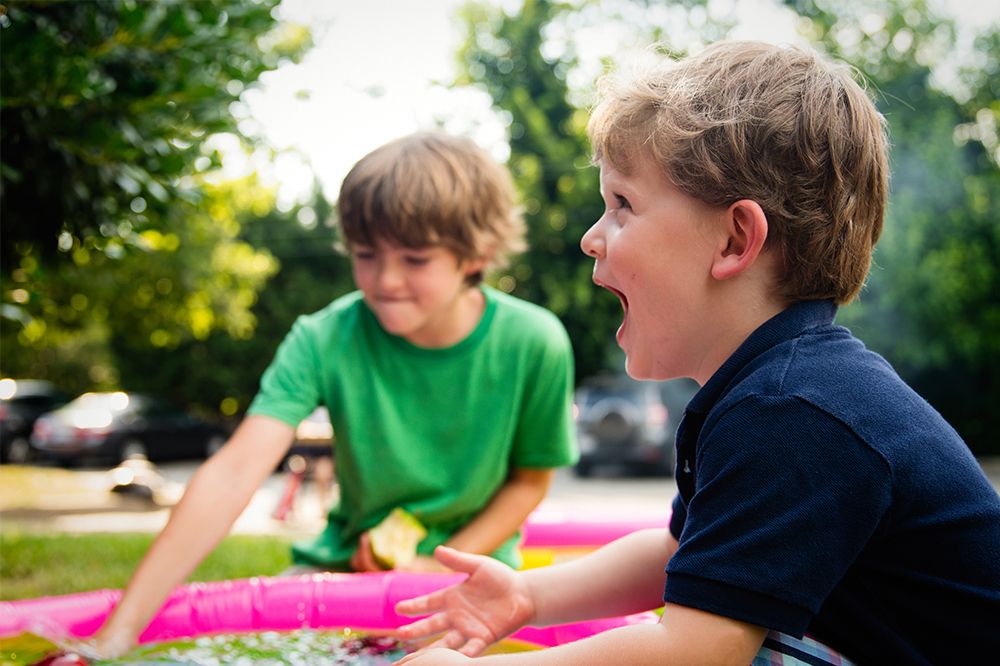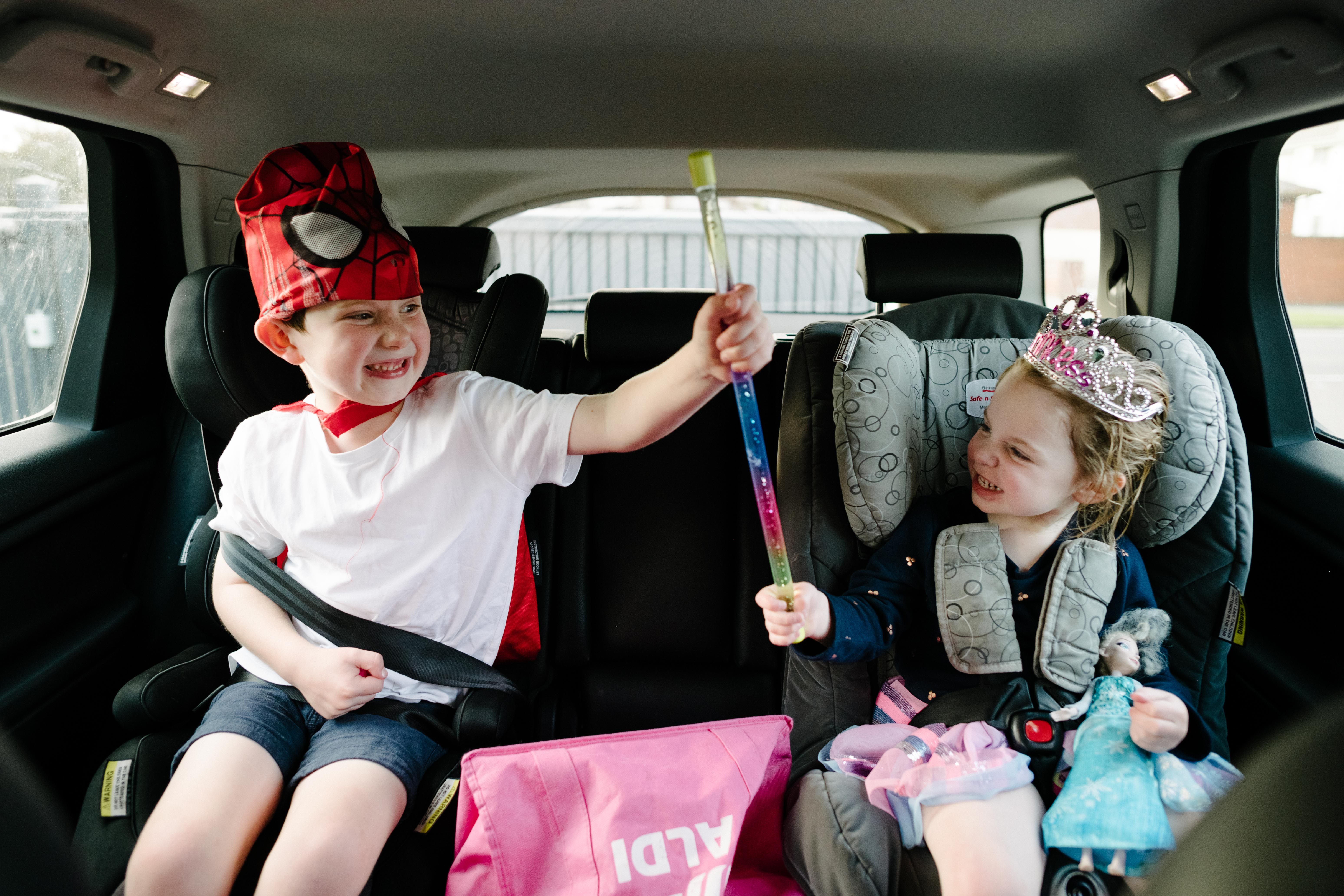Improving Social Skills In Children
Key points:
- Social skills are an important part of your child’s development, and sometimes children need your help to develop these skills.
- Struggling to make friends could be a sign that your child needs help with social skills – but there can be plenty of other signs too.
- You can teach your kids to pause and consider their response before acting in a social situation.
- You can help your child improve certain social skills, like sharing, making eye contact or using manners.
So many of our daily interactions require social skills, whether it’s ordering a coffee, solving issues with your co-workers, or offering someone a seat on the train. We’ve had years to build up our knowledge of what’s appropriate and inappropriate behavior – for example, not angering uncaffeinated people by skipping to the front of the coffee shop queue. But kids are still learning the basics. Kids aren’t born knowing how to interact with other people. But social skills are something we, as parents, can help them learn.
What social skills do children need?
Things like sharing, taking turns, listening to instructions, following the rules of a game, resolving conflicts with their siblings and saying ‘please’ and ‘thank you’ are all examples of social skills that children need to learn.
A lot of these social skills will develop as a result of watching you interact with others, and of course, by your kids interacting with you. That’s why spending quality time with your children every day is so important. Practice skills like sharing and taking turns, using eye contact, talking in a confident voice and even how to interact online. This will equip your kids with skills for forming relationships with other people like friends and teachers.
Communication skills for children
Communication is the foundation of social skills. But good communication requires more than just language. Kids need to learn ways to start conversations, choose what to talk about, and express their thoughts and feelings appropriately. Explain to your child that it’s not only what they say, but how they say it that matters. Their tone of voice, speaking volume, eye contact, facial expressions, and gestures all play a role in good communication.
What are some common social skills problems in children?
While social skills often develop of their own accord, it’s not uncommon for children to need some help in developing them. Thankfully, that’s what you’re here for.
Look out for some of these common social skills problems in children as a sign that they may need some support from you:
- Having poor manners
- Avoiding other children and not having many friends
- Having difficulty with sharing or taking turns
- Avoiding eye contact
- Having poor conflict resolution skills
- Finding it hard to talk to new people – perhaps being shy or anxious
- Misreading social cues – for example, they might not notice that others are angry at them or think others are angry when they’re not.
If you feel that your child is taking longer than normal to pick up social skills, you could check in with your doctor or pediatrician to discuss the possibility that something else is going on. For example, some children with autism spectrum disorder find social interactions more difficult and may need extra support with developing social skills.

Why is my child struggling to make friends?
Just like us, kids don’t always ‘click’ with the people around them. We’ve all had to sit through an awkward work event or wedding where we barely had anyone to talk to. That’s fine every now and again but if your child consistently finds making friends difficult, there might be a reason.
It could be that your child is naturally shy and anxious. It might be especially hard for them to approach other people, start conversations and engage in play. If this is the case, it could help you to model effective strategies for engaging in conversation and meeting new people. You could discuss with them different ways to start conversations, specific questions they could ask other kids, or activities to share with another child at school or daycare. It is then important to rehearse these skills at home with your child, as this can help them feel confident to use these new skills in different situations.
Struggling to make friends could lead to low self-esteem, and may impact their mental health down the track. If your child isn’t developing friendships naturally, talk to them about it. Watch out for signs that they’re experiencing bullying. If other kids are targeting them, it may prompt them to avoid social interaction altogether.
How can I help my child develop better social skills?
Use “Pause-Consider-Act”
If your child struggles to resolve conflicts without a full-blown meltdown or fist fight, you could consider introducing them to the Pause-Consider-Act strategy.
- PAUSE. Recognize that something is not right, and think about the problem.
- CONSIDER. Brainstorm several different solutions and think of advantages and disadvantages for each.
- ACT. Choose the best solution and go for it. Afterwards, think about how it went. Was it actually the best option?
Following these steps can help your child think about the many ways to respond to social situations and keep them from acting impulsively. You could even make it color-coded and fun by using a traffic light analogy (red for pause, yellow for consider, green for act).
Encourage your child to practice the steps even when they’re not in the thick of feeling upset. For example, you might help a character in a book solve a problem by discussing how they might use Pause-Consider-Act. It’s great to openly use the strategy when dealing with your own problems too.
Create a Social Skills Practice Plan
Maybe your kid is a pro when it comes to listening to instructions, but they’re not great at sharing. Helping them nail this skill will require an approach specific to sharing. Creating a Social Skills Practice Plan can help.
Here's how it works:
- Identify your child’s social strengths and weaknesses.
- Consider ways to help them try new behaviors. This might include rules about social skills and rewards for using them.
- Identify and define target behaviors/activities. Everyone should agree on what needs to be accomplished, or what your child will do.
- Start with social skills that are easy to learn and teach, to help reinforce the learning process and build confidence. After this, gradually move up to harder tasks.
- Praise and reward your child when they succeed.
Here’s an example of a Social Skills Practice Plan for a child whose goal is to work on sharing:
- Write down examples of when I can practice sharing.
- Practice sharing TV time with my sibling – there’s only one TV and everyone wants to watch something different.
- Talk to mom and dad about ways I can be a better sharer – at home, at school, with friends.
- Practice taking turns playing a one-person game on the Xbox with a friend.
- Practice talking to other people about what they want to do.
- Practice speaking calmly and directly, even when something feels unfair.
Add expectations to family rules
Add any target behaviors to your family’s set of behavioral rules. This could include things like:
“Always say thank you when someone does something nice for you” “Ask permission before doing X”.
Talk to your child about what to expect if they don’t follow these rules or expectations and be clear that if this happens, you're going to call them out on it.
Improve specific social skills
Helping a child learn to share
Toddlers and preschoolers may struggle with sharing, as they’re still learning to manage their emotions and see other people’s perspectives. However, it’s never too early to start encouraging this sort of behavior. Here are some tips to help a child learn to share:
- Draw attention to examples of sharing, making comments like, “Wow! Look at that girl sharing, she’s so kind.”
- Give your child plenty of praise and attention when you see them share.
- Spend quality 1:1 time playing games that involve sharing and taking turns.
- Ahead of a play date, talk to your child about how they can take turns with a toy when their friend arrives. Follow this up, by providing praise and rewards for your child when you see them sharing.
Helping a child make friends
Young children may play together nicely, but more complex friendships tend to start around school age. Talk to your child about making friends. If they’re struggling to develop friendships, ask them what they think the problem might be.
Make sure you also model good social skills for your child to help them learn by example. Even striking up a conversation with the cashier at the supermarket is a good example of how to interact with new people, skills which your child can use to make friends.

Helping a child apologize
When kids need to apologize for their behavior, encourage them to do more than just say ‘I’m sorry’. Here are a few tips on helping your kids ace the art of apology.
- Ask them what they could do to make it right. For example, if they broke another child’s toy they could help to fix it or help select another toy for them to play with. This makes an apology more meaningful by accompanying it with action. Follow up by asking them what they’d do differently next time, instead of breaking the toy.
- Be patient. All children make mistakes, and learning to apologize is an important yet challenging skill to teach. It’s best not to demand apologies from children, especially during the heat of the moment. This can become a power struggle between parents and children, and the apology then loses its meaning.
- Wait until everyone is calm to discuss behavior. It is important to remember that lengthy conversations about a problem behavior after it has occurred can sometimes prolong the misbehavior. Plus added attention can also be rewarding for children.
- Lead by example. Let your child see you apologize when you make a mistake and invite them to do likewise.
Remember, your kids aren’t going to learn all the social skills they need overnight. And if they’re struggling you can always check with a doctor or specialist if you need more support.
There are so many nuances to how we speak, act and interact with each other. And a lot of adults struggle with some of this stuff too. Navigating social skills with your child may feel overwhelming at times but by persistently encouraging their social development with positive reinforcement, you can help them manage this big complicated world of social interactions.
Want to learn more?
Movember launched Family Man to improve the confidence and mental health of dads.
Learn how to master kick-ass parenting strategies by getting started with Family Man. It’s an interactive parenting video series that's expert-backed and funded by Movember.
If research is your thing take a closer look at the evidence behind Family Man.
Or learn more before diving in.